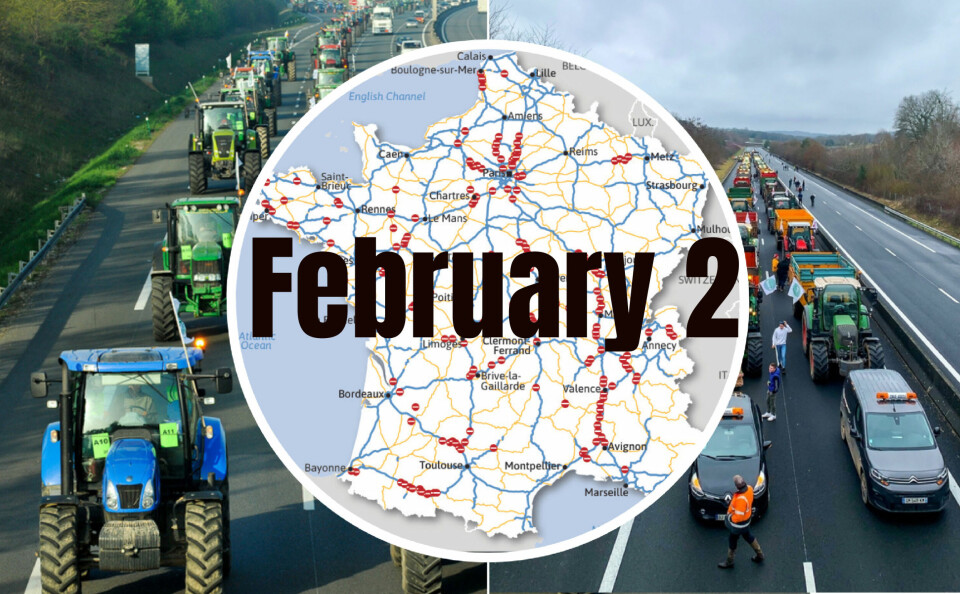-
French woman given one-year sentence for hiring men to evict squatter
Homeowner from south-west found guilty by Bordeaux criminal court
-
Drinking tap water restricted for children in south-west France communes
Haute Garonne prefecture says the measure is precautionary and due to high chlorate levels
-
French prime minister faces fresh problems to pass a 2026 budget
MPs continue to argue over budget but alternative measures could possibly see government toppled
French farmer roadblocks start to end - but not all
Unions call off action after extra concessions from the government. €400m in aid has been pledged in total

Many French farmers are ending their roadblocks after two leading unions called an end to the protests following significant new concessions from the government.
Farmers have been protesting since January 20 using parked tractors and bales of straw to create roadblocks on motorways around the country. In other places they deliberately slowed traffic with rolling barricades or prevented access to shops and food distribution centres.
Their demands included an end to the growing burden of French and European regulations - including environmental regulations on the use of pesticides - more protection for their profit margins via stringent application of the EGalim law (that obliges supermarkets to preserve the profit margins of food producers), and protection from unfair competition from foreign imports that are not subject to EU regulations.
However the tipping point for many protesters was the new tax on agricultural diesel or gasoil non routier (GNR).
Several of these demands have been met over the past week, including a suspension of the planned tax on GNR. However, the protests continued, with farmers manning a total of 98 roadblocks around the country on February 1 alone, including on eight motorways around Paris.
Towards the end of the protest?
In a push to end the crisis, Prime Minister Gabriel Attal announced a range of measures alongside the Minister of Agriculture Marc Fesneau, the Minister of Economy Bruno Le Maire and the Minister of Ecological Transition Christophe Béchu at a press conference on February 1.
“The negotiations were never broken and my door was always open,” said Mr Attal.
In particular, he announced:
- A plan to include food sovereignty in French law: “The two key words for agriculture will be production and protection”.
- €150m in state aid to help farmers pay taxes: “Farmers have specific needs… this tax aid will be longstanding and will start from this year”.
- Strengthening of the EGalim law: “Farmers’ revenue amounts to their dignity,” he said.
- To ban imports of food that used the pesticide Thiacloprid: the use of pesticides that are banned in Europe represents “unfair competition”.
- To negotiate with the EU on cereal imports from Ukraine.
- To raise the inheritance allowance for farms: “It is only by involving future generations that we can save French agriculture in the long term”.
- Checks in supermarkets to ensure the ‘Made in France’ label is not misused: “It is not acceptable that the French origin of products, which is a sign of quality, is misused by companies to the detriment of farmers”.
- To suspend the Ecophyto anti-pesticide plan: “the plan will be suspended until we have reworked and simplified it”.
- A 50% reimbursement on the GNR tax
- €2billion in tax allowances to help new farms
The Ministry of Economy confirmed to AFP that the total value of the government’s offer is €400m, half of which will be paid as reimbursement for the GNR tax.
Following the press conference, the two largest farmers’ unions FNSEA and Jeunes Agriculteurs called on their members to stop blocking roads. However, the Confédération paysanne union has not followed suit.
Read more: Key points of new French prime minister’s traditional policy address
Have the protesters stopped blocking roads?
Many of the major roadblocks have been removed and others are expected to follow by February 3.
In particular, all of the roadblocks have disappeared in Occitanie, and those in Brittany were expected to be cleared by 14:00 on February 2.
However, the authorities will have to ensure the motorways are completely clear of debris before they can be opened fully.
Where are the roadblocks on February 2?
|
Region |
Roads |
Where |
Type |
|
Auvergne-Rhône-Alpes |
A7 |
Seyssuel, Isère |
Roadblock |
|
A43 |
Saint-Quentin-Fallavier, Isère |
Roadblock | |
|
A7 |
Albon, Drôme |
Roadblock | |
|
A71 |
Clermont-Ferrand, Puy-de-Dôme |
Roadblock | |
|
Bourgogne-Franche-Comté |
A6 |
Bierre-lès-Semur, Côte-d'Or |
Roadblock |
|
A6 |
Beaune, Côte-d'Or |
Roadblock | |
|
A6 |
Mâcon-Sud |
Roadblock | |
|
A31 |
Nancy-Beaune |
Roadblock | |
|
A36 |
Besançon-Beaune |
Roadblock | |
|
Centre-Val-de-Loire |
A11 |
Between Thivars and Chartres-Est, Eure-et-Loir |
Roadblock |
|
N154 |
Serazereux, Eure-et-Loir |
Roadblock | |
|
Hauts-de-France |
A1 |
Between Chamant and junction with N104, Oise |
Roadblock |
|
A16 |
Between exits 13 and 16, Oise |
Roadblock | |
|
Ile-de-France |
A1 |
Between Senlis (Oise) and Roissy-en-France |
Roadblock |
|
A5a |
Réau, Seine-et-Marne, |
Roadblock | |
|
A6 |
Villabé, Essonne |
Roadblock | |
|
A10 |
Dourdan, Essonne |
Roadblock | |
|
A13 |
Mantes-la-Jolie, Yvelines |
Roadblock | |
|
A15 |
Argenteuil, Val-d'Oise |
Roadblock | |
|
A16 |
Isle-Adam, Val-d'Oise |
Roadblock | |
|
N12 |
Between Plaisir and Méré |
Roadblock | |
|
Normandy |
A13 |
Gaillon, Eure |
Roadblock |
|
A150 |
La Vaupalière, Seine-Maritime |
Roadblocks | |
|
Pays-de-la-Loire |
Leclerc logistics hub |
Saint-Etienne de Montluc, Vendée |
Roadblocks, protests |
|
Provence-Alpes-Côtes-d'Azur |
Around Miramas |
Bouches-du-Rhône |
Roadblocks |
|
A51 |
At A8 junction, Bouches-du-Rhône |
Roadblock |
Read more:
SEE: support for French farmer protests higher than for gilets jaunes
























